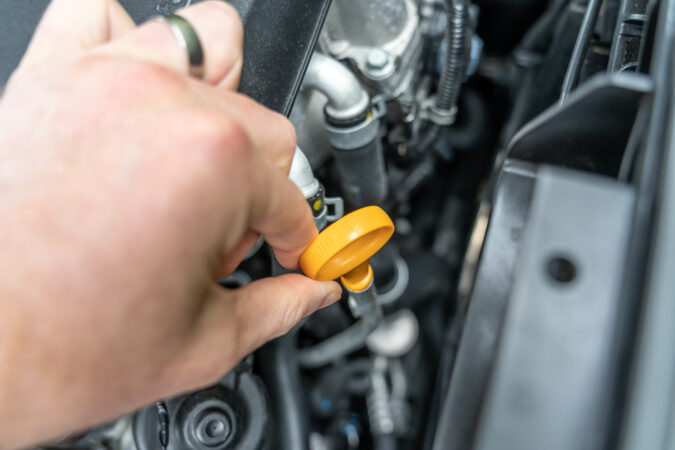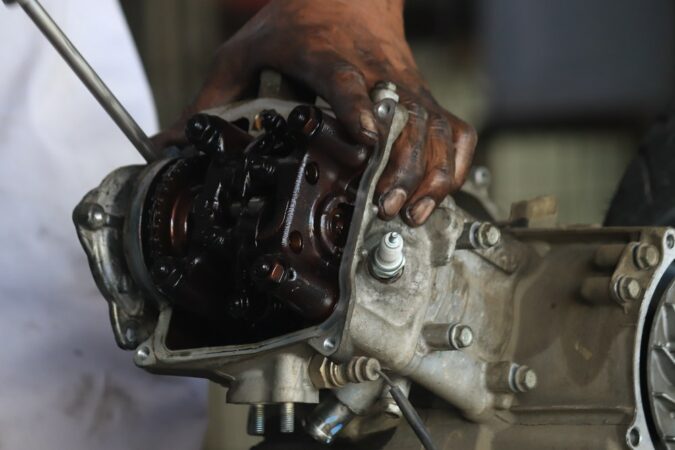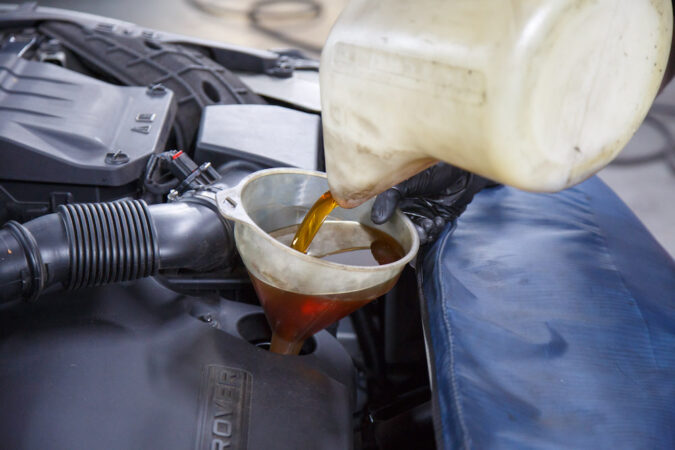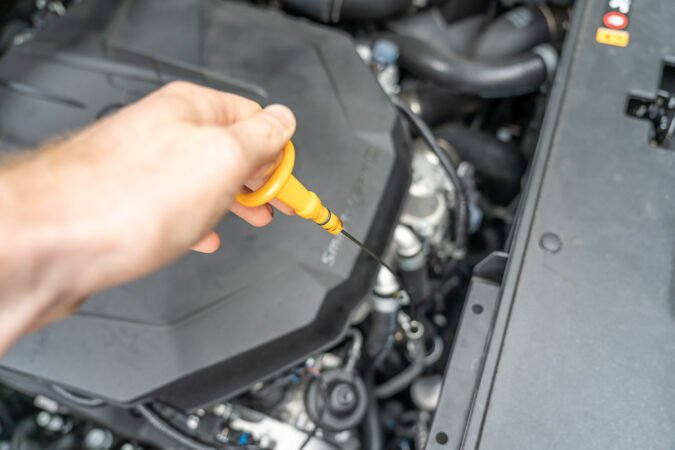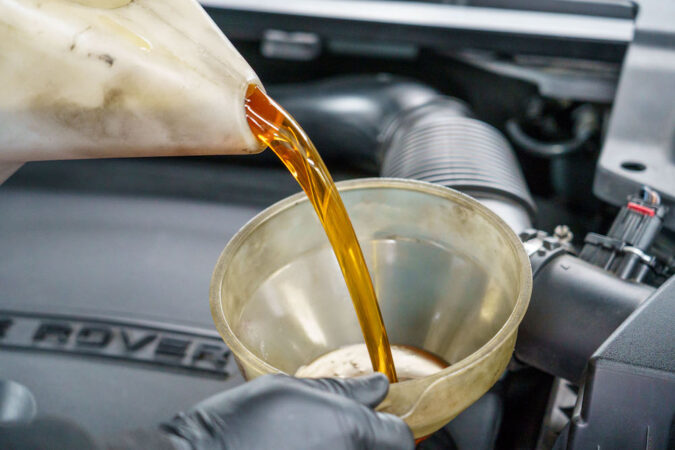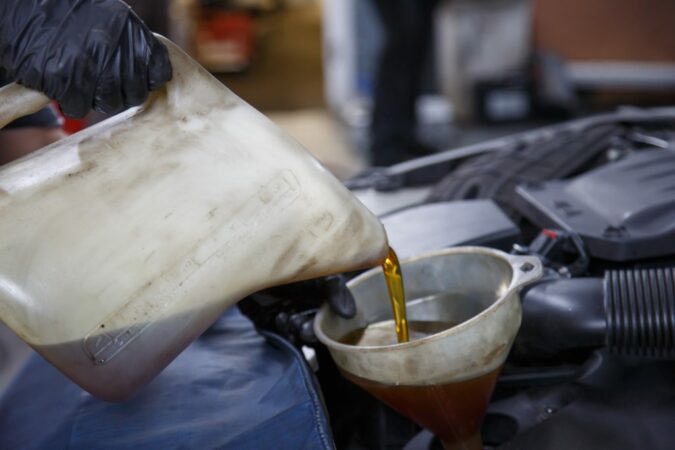If fuel is considered to be the food of a motor car, engine oil is its blood. Running with no oil in car can not only reduce the performance but also end up in a catastrophic engine failure. So, what is engine oil? And what is its function?
There is no need to introduce this lubricant. Anyone who has even the minimum experience in using a motor vehicle knows its importance. It keeps the engine running in its top nick. This is why engine oil replacement is an unavoidable part of routine vehicle maintenance.
But usually, nobody shows the guts to run with no oil in car, and hence it is fairly unknown to most what happens with no oil in car. In this story, we explore the importance of engine oil as well as the aftereffects of running with no oil in car.
Importance Of Engine Oil
The engine oil in itself is easily the single most important fluid in the system of a motor car. This lubricating fluid does a lot of work at once, and running with no oil in car can be the harshest thing you can do to your engine.
Forget not servicing your engine, forget not maintaining your vehicle properly. Forget all else. If you drive with no oil in car, that is equal to punishing your vehicle. So, it is imperative that everyone who drives a motor vehicle should know the importance of engine oil.
It is also essential to keep track of the maintenance as well. The engine oil needs a change, along with a new oil filter during every service. The interval to do this depends on the vehicle, and the engine oil used. In fact, it is beneficial for the long life of your engine to change the oil sometime before the stipulated interval. This keeps your engine in top nick. It keeps the condition of the engine oil on the top of your mind, reducing the possibility of running no oil in car.
The engine oil is not just a lubricant, though reducing friction between engine components is its primary responsibility. Modern engine oils come infused with a bunch of additives that offer numerous other advantages. Let us look at the few main responsibilities taken care of by engine oil. These will also give you an idea about what can go wrong if you run with no oil in car.
1. Lubricating The Engine
This, of course, is the most important responsibility taken care of by the engine oil. Hence, this is the very property or the lack of it, that damages an engine heavily. Thus, this is the biggest fear you must have if there is no oil in car. An internal combustion engine has multiple moving parts that move thousands of times in a minute.
The tolerance in an engine is awfully tight. So, if there is no film of oil lubricating these metal parts, they can rub against each other and cause damage. Hence if there is no oil in car, the engine parts can wear down each other. With no oil in car, you can expect a lot of heat, and the sound of catastrophic engine failure.
2. Cooling The Engine
Every motor vehicle has some sort of cooling system. Smaller engines usually have air cooling, and most modern car engines come with elaborate liquid cooling systems. Engine oil assists this system by taking away some of this heat from the engine.
The constant movement of engine parts creates a lot of friction and a lot of heat. The cooling system and the engine oil take away this heat through their respective circuits. While the coolant can cool down the block and the head of the engine, engine oil can go deeper than that. It can take away heat from the crankshaft, connecting rods, pistons, and the cylinder from the inside. The ambient air flowing over the oil pan under the vehicle cools the engine oil.
With no oil in car, the engine cannot function at its optimal temperature. Though the cooling system can cool the engine down, it loses the assistance from the engine oil. This can reduce the engine efficiency and can cause issues.
3. Cleaning
Gone are the days in which engine oil is only used for lubrication and cooling. Several additives in modern engine oils introduce other benefits to the picture. The cleaning effect of the engine oil is such a successful benefit.
Fast-moving engine parts scrape away microscopic bits of themselves away during their fast operation. To add to the worry, residue from combustion and dust come in. With no oil in car, these particles can remain inside the engine. It can clog the engine and reduce the performance.
The engine oil has a cleaning action that takes away these impurities. These are then trapped in the engine oil filter. The detergent properties of the engine oil help in reducing these particles and save the engine from clogging up.
4. Corrosion Protection
If you watch videos on how to store a motorcycle for longer intervals, they all mention using grease or oil to coat the corrosion-prone surfaces. The film of oil or grease prevents the bare metal from coming in touch with the air. This saves the oxidization, and as a result, corrosion.
Engine oil has the same effect on the engine parts. Without the film of oil coating them, these metal parts can oxidize and corrode over time. But, with no oil in car, this may be the least of your worries. Because the engine will overheat and break down even before the engine parts can think of corrosion. But when we talk about having no oil in car, it is good to know what low-quality oil or no oil can do to your engine eventually.
5. Sealing Engine Parts
This is another lesser-known benefit of engine oil. The oil can form a protective layer on vital engine parts like cylinders, pistons, and crankshaft, sealing any tiny clearances.
With no oil in car, these clearances can be the sites for particle deposits to form. Metal particles, after products of the combustion etc. can get accumulated in these areas. This will affect the engine performance a bit.
What Happens If There Is No Oil In Car?
This is not something that everyone needs a lesson on. Ever since your first driving experience, you must be tutored on how important this fluid is to your engine. Along with this, you must have also read about what can go wrong if you run the engine with no oil in car.
Still, most people do not know what goes on inside an engine if there is no oil in car. The common knowledge is mostly limited to an overheated engine and a car that stops and steams. But there is more to it than just an overheated engine.
How about we list down everything that can go wrong if there is no oil in car? We will look at each situation and what damage it can cause to your engine.
1. Excessive Wear And Tear Caused By No Oil In Car
The most obvious disadvantage of having no oil in car is the acceleration of wear and tear inside it. The engine parts move at mind-numbing speeds. With nothing to smoothen the friction, it is bare metal brushing on bare metal, thousands of times in a minute. A disaster is bound to happen.
An engine is going to experience wear and tear in its lifetime. Not even the most sophisticated oil in the world can completely eliminate it. But with no oil in car, it will experience years’ worth of wear and tear in just a few minutes.
If this no-oil massacre goes on without any concern for the engine, it will give up. All the engine parts will be severely damaged. This can bring about huge repair costs. In many cases, the engine goes beyond the point of repair completely.
2. Uncontrollable Heat Caused By No Oil In Car
What happened when you brush a metal on another one continuously? The friction between them produces heat that can go beyond a tolerable point. Now imagine the same in an engine, where metal pistons reciprocate inside metal cylinders thousands of times in a minute. As we learned that having no oil in car can end up increasing the wear and tear in the engine, it is easy to understand yet another cataclysmic aftermath.
Heat. A lot of it. The lack of oil the engine leaves the engine with no lubricant to reduce the friction produced inside it. This, along with higher wear and tear can produce a lot of heat. This is why the very first symptom of having no oil in car is the temperature gauge shooting up.
All car engines can run at elevated temperatures. The temperature inside the combustion chamber can be stratospheric. But there is still a limit for the heat. If the heat goes beyond the operating temperature of the engine, it can damage the internals.
The first part to let go if there is no oil in car will be the piston rings. Then if you keep driving again, pistons can crack, spark plugs can melt, and you will face a massive loss in power.
If these signs are not enough for you to stop, you must be on a mission to kill the engine. Driving even after all these signs pop up can end up with very nasty results. After a point, the engine reaches a situation that can be considered a total meltdown. At this stage, the heat must have pretty much eaten through almost everything inside the engine. You may be able to salvage a few parts from the wreck, but you most probably will need a new engine.
3. Sludge And Tar Buildup Caused By No Oil In Car
Engine oil is responsible for its detergent action, keeping the internals clean of sludge and tar buildup. These are produced during the combustion that happens inside the engine. These carbon byproducts can slide into different areas of the engine where it is not welcomed.
The cylinder walls and bearings take the brunt of this buildup. Having no oil in the system will only make it worse, as this process will be accelerated. Having low oil levels can also bring up this issue.
This buildup on the walls can increase friction, increasing the wear and tear on your engine. Over time, your engine is going to lose a lion’s share of its performance. But this happens only when the oil level is low. If there is no oil in car, it will only take a few moments for the engine to die out.
What To Do If There Is No Oil In Car?
If you have driven with no oil in car, it is hard to undo the damage. It is not easy to fill in the engine oil again and be on your way again. There is a lot of things you need to take care of before you hit the road. Let us look at the steps you should take if you have driven with no oil in car.
Step 1
Stop! The moment you realize there is no oil in car, the first thing you should do is pull over safely. Driving again to reach the nearest dealership is not the right idea at this moment. You will end up creating more trouble for your vehicle by doing this. Your final repair bill may be in the hundreds if you stop right away. A few more miles can easily hike it up to thousands.
Step 2
If your engine oil is low, the next best thing you can do is fill in more oil, but this is only recommended if you are properly sure that the engine is not damaged at all. In this case, fill in the oil, start it and leave it idling for a while. Then you can drive the car to the service center.
But if there is no oil in car at all, driving the car again is the worst you can do. In these situations, you should call for a flat-bed or a tow truck.
Step 3
Tow the car to the nearest mechanic or service center where your vehicle can be thoroughly inspected by an expert. They can assess the situation and let you know if your car has suffered any damage or not.
If they spot any damage, stick to what they say and replace whichever part they suggest. Though this may not bring back an extensively damaged engine to a new life, it can salvage some more life out of it. But in some cases, you may have to scrap the mill entirely.
Step 4
Once your engine is repaired and ready to hit the road, you should do one final thing. Not repeat the mistake again. Before your engine turns over the next time, you should fill in with oil again.
Fresh oil can give your engine a new lease of life. It is also extremely important to change your oil filter with every oil change. Use the right grade and type of oil, as recommended by the manufacturer. But how do you choose the right kind of oil? Allow us to explain.
Types Of Engine Oil
Having no oil in car can take a toll on your engine’s health. Filling in the wrong oil can also have a similar effect. It is necessary to know what kind of oils are available in the market as well as the right grade for your engine.
According to their chemical composition, motor oils are divided into three, mineral, synthetic blend, and full synthetic. Each of these types has its own advantages and disadvantages
1. Mineral Oil
These are the oldest technology when it comes to engine oils. These oils are derived from minerals, i.e., petroleum. Refineries use petroleum oils to create these oils. This is a technology used to produce engine oils for many decades till synthetic oils came into the scene.
Though they are good with most temperature ranges, their synthetic counterparts belittle their capabilities. Modern mineral oils come mostly mixed with additives that improve their performance.
Many buyers prefer mineral oils for their low cost. Even though synthetic oils are taking away the market, mineral oils still find some applications. They are still the preferred type of oil for cost-sensitive applications like low-performance motorcycles, chain saws, lawnmowers, etc.
Mineral oils due to their primitive technology cannot match the newer oils in terms of lubrication, cooling, and more. In high-RPM engines, usage of mineral oils can bring down their efficiency. If you own a supercar that can rev to the moon, adding an inferior mineral oil can be equal to running no oil in car. Hence, it is always mandatory to stick to the grades and type of oil recommended by the manufacturer. To meet the requirements of the new-age engines, synthetic oils are now available.
2. Synthetic Engine Oil
These are fully synthetic engine oils with the finest of molecule sizes. The latest technology works to create these kinds of oils. These oils are far superior compared to mineral oils.
First off, synthetic oils are better in terms of lubrication and cooling. Synthesized to be as fine and smooth as possible, they can form the smoothest of films between the piston and the cylinder walls. This reduces friction to a great extent, warding the internals from heat and wear. They can also reduce the buildup of sediments in the engine, helping it with a few more years of life.
They can also work in a far wider range of temperatures than mineral oils. It is far more resistant to temperature fluctuations and can handle them without reducing its efficacy. Another advantage is that synthetic oils go a longer distance than mineral oils. They do not degrade as quickly, hence there is no need to constantly change them.
The only fact that works against synthetic oils are their cost. With all this tech going into its production, these oils are significantly more expensive than mineral oils.
3. Synthetic Blend Engine Oil
This is the type of engine oil that blends the best of both worlds. Not really the best, but you know the gist. These are mineral oils blended with synthetic elements that elevate their properties.
Though they cannot match the high efficiency of fully synthetic oil, these blends can take the mineral oil farther than it is capable of on its own. The synthetic additives are added to improve the working temperature range, lubrication, cleaning, and cooling properties of mineral oils. They also enhance the viscosity and the wear resistance of these oils.
Compared to mineral oils, synthetic blend oils are more expensive. However, it will not demand as many bucks as the full synthetic oils. The premium will be only a few dollars above the cost of comparable regular mineral oil. This makes the synthetic blend oils a perfect option for cost-effective customers looking for decent engine oil.
You need not buy the mineral oil and live with its drawbacks. There is no need to spend more than their budget for full synthetic engine oil as well. Synthetic blend engine oils provide you with decent performance at a lower budget. Best of both worlds, really. Your wallet will agree.
But no matter which engine oil you choose, make sure that the grade is what the manufacturer has recommended. Any oil, mineral, fully synthetic, or synthetic blend will work better than running with no oil in car.
Facts: Signs of Engine Damage from Low or No Oil
- Oil is crucial for keeping your car’s engine cool and lubricating its moving parts; without it, damage can occur quickly.
- Clicking and clunking noises, stalling, and smoking are signs of possible engine damage from low or no oil.
- The oil light turning on, a burning smell, dropping gas mileage, and other warning signs may indicate low oil levels and the need for an oil change.
- Driving a car with no oil can cause irreversible damage in less than 30 minutes, so it’s essential to address low oil levels promptly.
- An oil pump or oil filter that is failing or faulty may be the cause of low oil pressure and levels.
- Regular oil changes can help prevent low oil levels and prolong the life of your engine; the frequency of oil changes depends on your car’s model, engine, and age.
- If you notice signs of low oil, get an oil change or visit a mechanic to diagnose any underlying problems.
- To fix low oil pressure, you can check the oil level and filter, replace the oil switch, and clean the oil strainer (as a last resort).
- When choosing a mechanic, ask for recommendations, search for reviews, and look for certifications and experience with your car’s make and model.
- If your car has low or no oil, pull over and turn off the engine, and call roadside assistance if necessary.
Having No Oil In Car: Final Word
By this time, you should be thoroughly clear that running with no oil in car is a horrible thing to do. It will not only damage your engine but can also eat into the wallet. Forget eating your wallet, it will swallow it whole.
So, always make sure that the oil level in your car is always at the optimum level. Religiously changing the oil and oil filter can also go a long way in ensuring that your engine will not have to go through the ordeal of having no oil in car.


